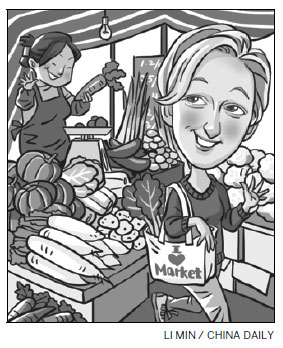
|
When visiting a foreign country, some people like to visit the monuments, others the restaurants while some want to seek out the natural wonders. I like the supermarkets. Wallis Simpson, the US socialite who married a British prince, once quipped: "I never make a trip to the United States without visiting a supermarket. To me they are more fascinating than any fashion salon." She was onto something. Supermarkets give a unique insight to a foreign culture. Forget temples and town halls - if you want to get a real glimpse into how the locals live, check out the cheese aisle in a Paris Carrefour, the frozen pies in an English Tescos and the bewildering array of impossibly perfect fruit in a United States Wholefoods. There are two supermarkets near my apartment in Beijing. One is called WuMart, and you will find them dotted about the city. On my first visit I stared, awestruck, at the gigantuan noodle and soy sauce aisles. Other shoppers must have thought I was very odd, taking pictures of the giant bottles of baijiu (liquor), studying the various jars of eggs and preserves. But the real treat was in the meat and seafood section, where tanks of fish jostle for space with aquariums full of live bullfrogs. Giant slabs of animal carcass are hung on display and shoppers select from piles of pigs trotters and chicken feet. WuMart is also notable for what it does not sell. There is no cheese, no Greek yoghurt, no pasta, tinned tomatoes or chickpeas. There is only a tiny amount of milk on offer. One of the hundreds of varieties of tinned fish is probably tuna, but I am yet to determine which. The other supermarket near me is Ito Yokado, which is actually part of a giant upscale department store. The supermarket is smaller than WuMart's. This is for posh shoppers, with ladies offering samples of the latest brand of frozen dumplings and special displays of hairy crabs during Mid-Autumn Festival and a fancy sushi station. Ito Yokado has a small selection of foreign goods, and so despite the high prices, I find myself bypassing the ladies shoe department upstairs to make the journey down to the supermarket in the basement to buy wine and passata, capers and cheese. But the foreign goods aisle is pretty limited. My already small repertoire of recipes was squeezed even tighter. It was then I discovered the market. Hidden away in a residential complex, I only found it after an in-the-know local led me there. It was a narrow building packed with food stalls. Vegetable sellers with heaving tables of fresh produce, a small butcher and a woman selling eggs and grain. One small stand has a man covered head to toe in flour. He spends his days making fresh noodles and dumpling skins, which you can buy for as little as 3 yuan (48 cents) a bag. There is a preserves shop, and a husband and wife team who serve up freshly made baozi (steamed stuffed bun) and an odds-and-ends stall, where you can buy everything from a new shower head to a jianzi, a sort of hacky sack ... with feathers. And finally, I had found the best place to shop. It wasn't the supermarket - it was the secret market. Where you can select the best-looking tomatoes and the ladies stuff a handful of coriander into your shopping bag. And without my staples of pasta and cheese, I've been forced to expand my repertoire. Making a not bad attempt at jiaozi (dumpling), ginger chicken and more stir fries and fried rice than I care to admit. I still love supermarkets, but if you really want to get a glimpse into China - shop like a local, find the wet markets. By Belle Taylor ( China Daily) |
去国外旅游时,有些人喜欢参观名胜古迹,有些人喜欢品尝特色美食,还有些人喜欢找寻自然奇观。 我却喜欢超市。 华里丝·辛普森(Wallis Simpson)是一个美国社交名媛,嫁给了一位英国王子。她曾打趣说:“我每次去美国都会去那儿的超市。对我而言,超市比任何时尚沙龙都吸引人。 她说的很对。超市可以让你更加深入地了解外国文化。如果你想要真正了解当地人的生活方式,那就把寺庙、市政厅什么的抛之脑后吧,去法国家乐福挑挑奶酪,去英国乐购买点冷冻馅饼,去美国有机商品超市看看那琳琅满目,新鲜香甜的水果吧。 我在北京的公寓附近有两家超市。一家是物美连锁超市,你会发现它们在北京随处可见。第一次去物美超市的时候,我看着京酱面还有酱油货架瞠目结舌。其他顾客肯定觉得我很奇怪,对着一瓶瓶大罐装的白酒猛拍照,还在那研究各式各样,品种繁多的蛋制品腌制品罐头。但是最让我惊讶的是肉类与海鲜区。这里有一缸缸拥挤的鱼和活牛蛙,大块大块的肉被悬挂起来,顾客在成堆的猪蹄和鸡腿中挑来拣去。 物美超市另一个引人注目的地方就是它没有销售的商品。超市里没有奶酪,没有希腊酸奶,没有意大利面,没有罐装土豆或鹰嘴豆。牛奶也只少量供应。鱼罐头倒是有数百种,其中一种可能是金枪鱼,但我不大确定。 我家附近另一个超市是伊藤洋华堂超市,它实际上是一个大型高级百货商场的一部分。这个超市比物美超市小的多。它专为时髦的顾客而设。中秋节时超市里有促销小姐提供最新品牌速冻水饺试吃,并特别供应大闸蟹,里面还有一个高档寿司点。 伊藤洋华堂超市有售一小部分的精选进口产品,尽管价格高昂,我还是发现自己会穿过楼上的女鞋部,走到负一楼的超市去买红酒、意大利番茄酱、酸豆还有奶酪。 但是进口商品种类十分有限。我本就有限的食谱这下更少了。 就是那时,我发现了一个藏在住宅小区里的菜市场。这还是通过一个当地“百晓生”的指引下我才找到那儿的。它是一个狭窄的建筑,里面食品摊比比皆是。这里有许多菜贩,他们的摊位上堆满了新鲜的农产品;有一个身材矮小的肉贩;有一个卖鸡蛋和谷物的女人。在一个小摊上,有一男人从头到脚都沾满面粉;他每天都在做新鲜的面条和饺子皮,每包只要3块钱。 这里还有一个腌制品店;一个卖新鲜包子的夫妻档;还有一个杂货铺,里面应有尽有,无论是淋浴喷头还是毽子,这里都能买到。 最后,我发现了最好的购物地点。不是超市——而是这个隐蔽的菜市场。这里你可以买到卖相最好的西红柿,卖菜的妇女们还会免费送你一把香菜。 因为买不到我想要的意大利面和奶酪等材料,我不得不增加我的食谱。我尝试了饺子、老姜鸡还有多到我不好意思承认的炒菜和炒饭,不过这些尝试都还不错。 我仍然喜欢超市,但如果你真的想要一窥中国——那就像个本地人一样购物,到菜市场去。 相关阅读 (译者 Jemer 编辑 Julie) |
